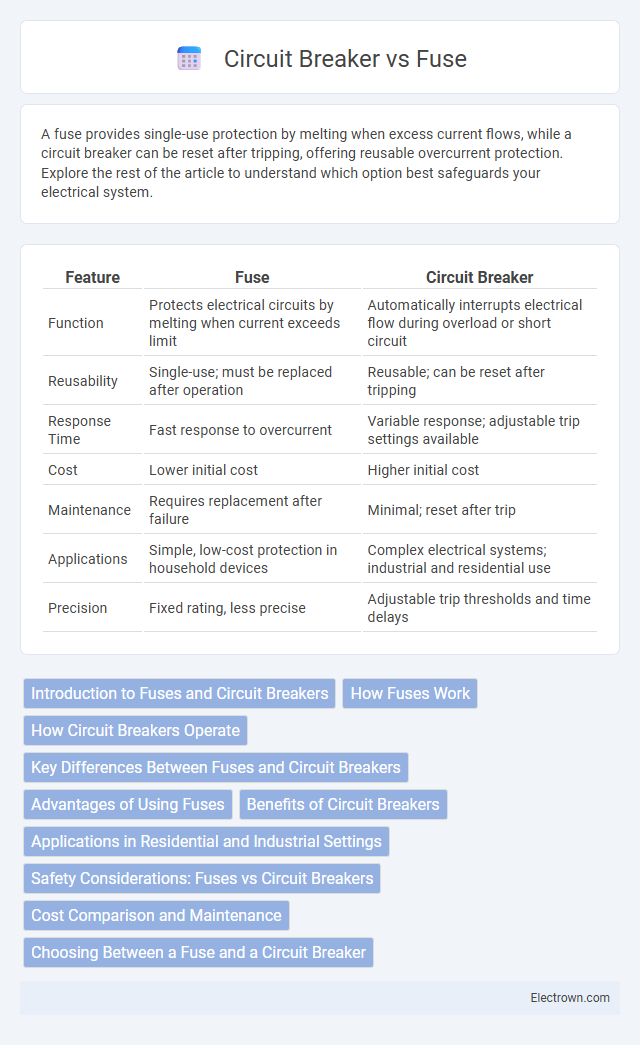A fuse provides single-use protection by melting when excess current flows, while a circuit breaker can be reset after tripping, offering reusable overcurrent protection. Explore the rest of the article to understand which option best safeguards your electrical system.
Table of Comparison
| Feature | Fuse | Circuit Breaker |
|---|---|---|
| Function | Protects electrical circuits by melting when current exceeds limit | Automatically interrupts electrical flow during overload or short circuit |
| Reusability | Single-use; must be replaced after operation | Reusable; can be reset after tripping |
| Response Time | Fast response to overcurrent | Variable response; adjustable trip settings available |
| Cost | Lower initial cost | Higher initial cost |
| Maintenance | Requires replacement after failure | Minimal; reset after trip |
| Applications | Simple, low-cost protection in household devices | Complex electrical systems; industrial and residential use |
| Precision | Fixed rating, less precise | Adjustable trip thresholds and time delays |
Introduction to Fuses and Circuit Breakers
Fuses and circuit breakers serve as essential electrical safety devices designed to protect circuits from overcurrent conditions that can cause damage or fire. A fuse contains a metal wire that melts when excessive current flows through, breaking the circuit, while a circuit breaker uses an internal switch that trips to interrupt current flow during faults. Understanding these components helps you choose the right protective device for your electrical system, balancing reliability, reset capability, and response time.
How Fuses Work
Fuses protect electrical circuits by melting their internal wire when current exceeds a specified limit, effectively interrupting the flow to prevent damage or fire. The metal wire inside the fuse is designed to heat up quickly under excessive current, causing it to blow and break the circuit. This simple but reliable mechanism ensures immediate disconnection in overload or short-circuit conditions, safeguarding electrical components and wiring.
How Circuit Breakers Operate
Circuit breakers operate by detecting electrical faults through built-in sensors that monitor current flow, triggering a mechanical switch to interrupt the circuit when an overload or short circuit occurs. Unlike fuses, which rely on melting a metal wire to break the circuit, circuit breakers can be reset manually or automatically after tripping, enhancing safety and convenience. They use thermal or magnetic trip mechanisms, or a combination of both, to respond rapidly to abnormal electrical conditions while maintaining system integrity.
Key Differences Between Fuses and Circuit Breakers
Fuses and circuit breakers are both essential electrical safety devices that protect circuits by interrupting current flow during overloads or short circuits. A fuse contains a metal wire that melts and breaks the circuit when excessive current passes through, requiring replacement after each use, while a circuit breaker uses an internal switch mechanism that trips to interrupt current and can be reset without replacement. Fuses offer fast response time and simplicity but lack reset capability, whereas circuit breakers provide reusability, easier maintenance, and often include features like adjustable trip settings and fault indication.
Advantages of Using Fuses
Fuses provide reliable overcurrent protection by quickly melting and breaking the circuit when excessive current flows, preventing damage to electrical components. They are cost-effective, simple to replace, and offer fast response times, making them ideal for protecting sensitive equipment. Your electrical system benefits from their inherent fail-safe design, minimizing fire hazards and enhancing overall safety.
Benefits of Circuit Breakers
Circuit breakers offer the advantage of being reusable, allowing you to restore power quickly without replacing components after a fault. They provide precise trip settings for better protection against overloads and short circuits, enhancing safety and reliability in electrical systems. Circuit breakers also enable easy manual operation for testing or maintenance, improving overall system control and convenience.
Applications in Residential and Industrial Settings
Fuses are commonly used in residential electrical systems for protecting wiring and appliances from overcurrent by breaking the circuit when excessive current flows, ensuring safety in household environments. Circuit breakers, preferred in industrial settings, offer advanced protection with resettable functionality and the ability to handle higher current loads, making them suitable for complex machinery and large-scale electrical systems. Both devices provide essential overcurrent protection, but circuit breakers enhance operational efficiency and maintenance in demanding industrial applications.
Safety Considerations: Fuses vs Circuit Breakers
Fuses provide reliable protection by melting and severing the circuit during overcurrent conditions, offering a one-time safety response that prevents electrical fires. Circuit breakers enhance safety with the ability to quickly interrupt current flow and can be reset multiple times without replacement, minimizing downtime and maintenance costs. Both devices comply with strict electrical safety standards, but circuit breakers offer advanced trip settings and diagnostic features for improved electrical system protection.
Cost Comparison and Maintenance
Fuses typically have a lower initial cost compared to circuit breakers, making them a budget-friendly option for basic electrical protection. However, fuses require replacement after a single use, leading to recurring expenses and potential downtime, while circuit breakers can be reset multiple times, reducing maintenance costs over time. Although circuit breakers involve a higher upfront investment, their durability and ease of maintenance generally result in more cost-effective long-term performance.
Choosing Between a Fuse and a Circuit Breaker
Choosing between a fuse and a circuit breaker depends on factors like response time, reusability, and cost efficiency. Fuses provide fast-acting protection and are cost-effective for low-budget or short-term use, but they require replacement after a fault. Circuit breakers offer resettable protection, ease of maintenance, and are ideal for applications needing frequent switching or higher safety standards.
Fuse vs Circuit Breaker Infographic

 electrown.com
electrown.com